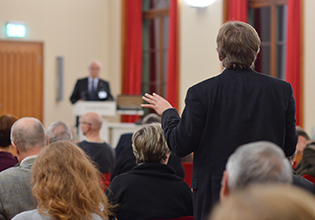Symposia
Linking Science, Society, Business and Policy for the Sustainable Use of Abandoned Mines in the SADC Region

Conference of the National Academy of Sciences Leopoldina and the Academy of Science of South Africa (ASSAf)
| Date: | Tuesday, 28 to Thursday, 30 November 2017 |
| Time: | 09:00 to 17:00 |
| Location: | Indaba Hotel, William Nicol Dr & Pieter Wenning Road, Fourways, 2021 Johannesburg, South Africa |
With ever increasing global demands for mineral resources and the associated rise in mining activities worldwide, pressure is mounting to soon find affordable ways of using exhausted mines in a manner that avoids former mining areas becoming long-term liabilities, often posing environmental and health risks while placing large financial burdens on future generations. Apart from once-off investment for post-closure remediation these costs are also caused by indefinite tasks such as ongoing post-mining water management.
In order to identify innovative ways for avoiding such scenarios from playing out – especially in the many mining-dominated developing economies of the SADC* region – international experts will meet at a dedicated conference in Johannesburg, South Africa from 28 to 30 November 2017.
Organised by the German National Academy of Sciences Leopoldina and the Academy of Science of South Africa (ASSAf) the conference is funded by the German Federal Ministry of Education and Research (BMBF). It forms a continuation of the ‚Science-Business-Society-Dialogue’ conference that took place in 2016 in Pretoria and aims at bringing together key players from these different backgrounds. In view of the enormous volumes of acid mine drainage emanating from flooded gold mines in and around Greater Johannesburg and the immanent closure of hard coal mining in the Ruhrgebiet of Germany in 2018, this year’s conference theme is highly topical for both countries, South Africa as well as Germany.
The conference will have approximately 100 hand-picked international experts from a number of mining nations including eminent scientists but also high-level representatives of the mining and associated manufacturing industry, civil society and policy. The emphasis is on innovative ways to prevent closed and abandoned mines from becoming long-term, if not indefinite, liabilities in an affordable and sustainable manner. Among other options this includes the use of closed mines for the generation and storage of renewable energy. For the first time the meeting brings together all five international research teams currently investigating the feasibility of this concept at actual sites in Australia, Finland, Germany and South Africa.
In addition, successes and failures in remediating legacy sites will be shared based on national case studies (e.g. German uranium and hard coal mining) as well as regional (UNESCO’s current study on abandoned mines in Africa) and global experiences (International Atomic Energy Agency, IAEA). The conference also explores social and legal requirements for successfully turning inherited liabilities into future assets and for preventing legacy sites from forming in the first place. Finally, new ways of beneficiation and resource extraction from mining waste are presented, too.
Participants include:
- Mr. Bobby Godsell (past CEO of AnglogoldAshanti Ltd. and special advisor to the South-African government)
- Representatives of international organisations (e.g. United Nations - International Atomic Energy Agency, UNESCO Research programme on impacts of abandoned mines in Sub-Saharan Africa, International Mine Water Association, International Geographical Union – Commission for Water Sustainability)
- Scientific institutions (from Germany: Technical Resource University Freiberg, Energy Research Centre Lower Saxony, Fraunhofer Institute IKTS Dresden, Ruhr University Bochum, Technical University Clausthal, University Duisburg-Essen; from South Africa: Council for Geoscience, Council for Industrial and Scientific Research, Mintek, North-West University, South African Institute for Mining and Metallurgy, University of the Witwatersrand, Water Research Commission; other: Chinese Academy of Science, Pwani University Kenya)
- Representatives of mining and associated industries (e.g. BBE Group, Chamber of Mines of Namibia, Chamber of Mines of South Africa, DMT GmbH und Co. KG, Genex Power Ltd, Mining Industry Association of Southern Africa, Pyöry Energy GmbH, Sibanye-Stillwater Ltd., Voith Hydro Holding GmbH & Co. KG, Wismut GmbH)
- Non-Governmental Organisations (e.g. Bench Marks Foundation, Federation for a Sustainable Environment)
- Governmental departments and institutions (e.g. Department of Trade and Industry, Department of Science and Technology, Department for Water Affairs and Sanitation, Southern African – German Chamber of Commerce and Industry: Competence Centre Mineral Resources)
*SADC = Southern African Development Community
